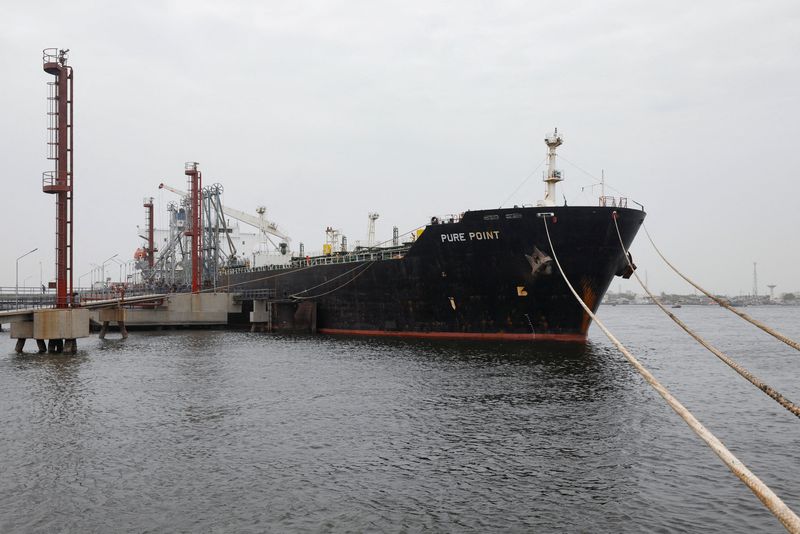By Julia Payne
BRUSSELS (Reuters) - The G7 and allies have shelved regular reviews of the Russian oil price cap scheme, people familiar with the matter told Reuters, even though most Russian crude is trading above the limit because of a rally in global crude prices.
Russian producers have found ways to sell oil using fewer Western ships and insurance services, making it difficult for the West to enforce the existing price cap because the companies facilitating the trade are outside of their remit.
The Group of Seven (G7) countries along with the European Union and Australia imposed the price cap mechanism on Russian oil last December, followed by a cap on fuel from February. Initially, EU countries agreed to review the price cap every two months and to adjust it if necessary while the G7 would review "as appropriate" including "implementation and adherence."
The G7 has not reviewed the cap since March, however, and four people familiar with G7 policies said the group had no immediate plans to look into adjusting the scheme.
"There were some talks in June or July to do a review, or at least talk about it, but it never formally happened," one diplomatic source said.
The sources said that while some EU countries were keen for a review they said that there was little appetite from the United States and G7 members to make changes.
The sidelines of the upcoming U.N. General Assembly later this month could serve as an informal platform for talks on the cap.
The mechanism allows third countries to buy Russian fuel using Western ship insurance if there is proof the purchase does not exceed price limits of $60 per barrel for crude, $45 per barrel of heavy fuel and $100 per barrel of light fuel such as gasoline and diesel.
The idea was spearheaded by Washington to cut Moscow's revenues amid its war on Ukraine while avoiding market disruptions as a result of an EU ban on Russian oil.
Benchmark Brent oil futures are trading at their highest this year at above $90 a barrel, raising the value of global crude, including Russian Urals.
Russia's finance ministry said the average price on its flagship crude grade Urals has recovered to $74 a barrel on average in August - well above the $60 a barrel cap - and up from an average $56 in the first six months of the year.
Russia was forced to cut exports of oil and products immediately after the price cap imposition as it struggled to find enough ships to transport all of its output.
However, the country has managed to move most of its exports into the hands of domestic or non-Western foreign shippers, which do not require Western insurance coverage.
Reuters calculated that at least 40 middlemen, including companies with no prior record of involvement in the business, handled at least half of Russia's overall crude and refined products exports between March and June.
While mostly "dark fleet" of tankers with murky ownership was being now used to transport Russian crude, Western ships were still involved in moving products since those were harder to police, an industry source said.

According to LSEG data, Russian crude has been trading above the cap since mid-July and is currently being traded at around $67 a barrel at Russian crude terminals. Russian refined products such as fuel oil and diesel have also surpassed their caps.
A U.S. Treasury official said this week the cap was still effective as it had helped cut Russian revenues. He said the group would stay nimble but added there was no plan for an immediate revision.